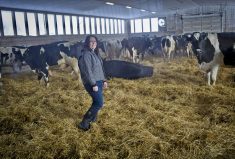A new umbrella group for independent farm input retailers was launched last week in a bid to continue offering farmers local service combined with top-notch agronomy support.
Dubbed the “Grow Community of Independents,” the organization is designed to make the 20 dealers in its network who operate out of 73 locations across the three prairie provinces more competitive in the face of steeper competition from the retail chains, line companies and new entries by agribusiness giants eyeing profits in the ag retail segment.
Since they first started talking 16 months ago, the seven founding partners have been joined by four more companies. Altogether they account for about 15 per cent of total market share for ag inputs.
Read Also

Mazergroup’s Bob Mazer dies
Mazergroup’s Bob Mazer, who helped grow his family’s company into a string of farm equipment dealerships and the main dealer for New Holland machinery in Saskatchewan and Manitoba, died July 6 from cancer.
“Our individual identities will not change,” said Corie Cowlthorp of the Boissevain-based Double Diamond Farm Supply. “At the end of the day, there is not one of us who would give up that localized brand identity. Too many people worked too hard over the years to create that.”
Many independent companies in other sectors have developed an umbrella brand strategy, because it offers advantages in negotiating with manufacturers, for example.
However, Grow will be much more than simply a “buying group,” he added.
“Agronomy needs to be the backbone of Grow. That’s what we’re going to live or die by,” said Cowlthorp. “We’ll put our money where our mouth is. There is going to be a ton of time spent on training.”
In Manitoba, besides Shur-Gro, Munro and Double Diamond, GJ Chemical, which has two locations in the eastern part of the province, has also joined the group.
Grow recently opened its head office in Saskatoon, where it will host a wide range of professional services for marketing, coaching, training and human resources management for member companies.
Dale McKay, representing Brandon-based Shur-Gro and Munro ag retailers, said the ongoing transition to larger farms and fewer farmers are pushing independents to improve their marketing prowess.
Fewer customers represent a larger percentage of annual sales.
Manufacturers recognize this trend, and are gearing up more towards direct sales to larger operators, he added.
Also, new disease and weed problems mean production issues are becoming increasingly complex.
“For sure, large companies are going to continue to expand in agriculture,” said McKay. “Independent dealers will be unable to compete long-term unless something changes.”
Independent ag retailers have never marketed their services aggressively in the past, and almost seemed to prefer to go “under the radar,” he said, adding that having the Grow brand will change that.
“If you look at the chains, your Viterras and Co-ops and the line companies, their predatory nature in crop inputs supports their core business, whether it’s fuel or grain,” said McKay.
“The trend is buying power. With their sheer buying power, they get attractive offers from manufacturers and suppliers.”
Another issue that the new umbrella group will address is the shortage of qualified staff and the difficulty of independents in retaining career agronomists, who may prefer to work for larger companies with more room for career advancement.
To assist in recruiting and retention, the group has launched a training program called Grow Academy for its 350 full-time staff, who will become “business agronomists” with the goal of helping farmers increase yields.
“The retail position as the smartest, best advisors and the biggest yield promoters is available,” said McKay. “Nobody has staked a claim to that one. That’s where Grow is headed.”
Ian Wishart, president of Keystone Agricultural Producers, noted that independent ag input suppliers have faced growing pressure from their larger competitors, and many have been swallowed up.
The fertilizer price spike in 2008 may have hurt farmers, but it hit many small retailers just as hard, he noted. Those who were stuck with mountains of product bought at record high prices were pushed to the verge of bankruptcy after the bubble burst and prices plunged.
Also, with big input manufacturers now moving into retail, the independents would benefit from a stronger negotiating position with suppliers.
“We’re always asking for stronger competition in the farm supply business, and I see this getting together of the independents as an opportunity to create that,” said Wishart. “By working together, they might be able to accomplish more and be able to pass that along to the farmer.” [email protected]
———
“AgronomyneedstobethebackboneofGrow. That’swhatwe’regoingtoliveordieby.”
– CORIE COWLTHORP


















